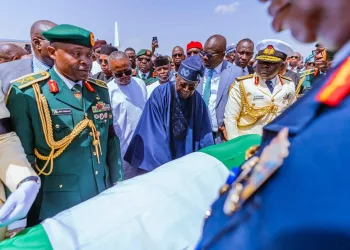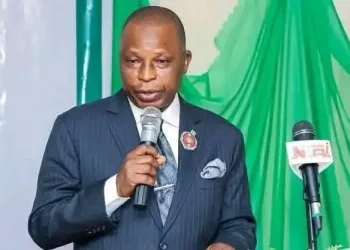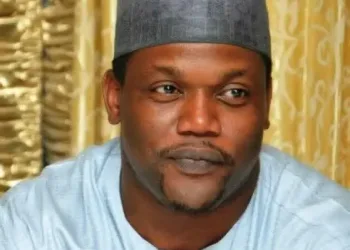The challenges facing Nigeria’s healthcare financing came under expert scrutiny recently at the review workshop and stakeholders’ engagement on budgeting and financing of Primary Healthcare and maternal and child health, organized by Development Governance International (DGI) Consult, with funding from the United Nations Children’s Fund (UNICEF).
The workshop, which took place at the Radiance Spring Hotel, Gudu, Abuja, examined the summaries of earlier public health expenditure analyses conducted across four Nigerian states: Bayelsa, Gombe, Niger, and Taraba. It reviewed the key findings on health budget allocations, expenditure patterns, spending distribution, and overall efficiency in resource utilization. The workshop also assessed the effectiveness of the GAVI Primary Health Care (PHC) Memorandum of Understanding (MoU), signed in 2022 between the GAVI health system strengthening project and eight state governments in catalyzing increased government investment in the health sector.
The workshop was attended by key stakeholders from the State Ministries of Health, State Primary Health Care Development Agencies (SPHCDA), State Ministries of Finance, State Ministries of Local Government, and state chapters of the Association of Local Government of Nigeria (ALGON) across the four states, Bayelsa, Gombe, Niger and Taraba.
The key findings and lessons learned from the earlier study provided critical insights into the state governments’ commitment to increasing health (particularly PHC) spending and identified gaps requiring urgent attention to enhance healthcare access, particularly for vulnerable women. The workshop was also effectively utilized to advocate for improved funding for primary health care, particularly maternal and child health.
In his opening remarks, Dr. Gafar Alawode, Chief Executive Officer of DGI Consult, presented the workshop objectives which included disseminating key findings from the public health expenditure analysis, advocating increased investments in priority areas, sharing policy recommendations and secure stakeholders’ commitment to improve resource allocation as well as to chart a course of action for implementation of the policy recommendations and identify strategies to optimize public health financing, particularly PHC and Maternal Neonatal and Child Health (MNCH), at the state and local government levels.
He expressed appreciation for the support of stakeholders and urged continued maximum support to ensure the successful realization of the goal , putting Nigeria on the trajectory of Universal Health Coverage (UHC).
In his welcome address, a Health Specialist at UNICEF, Dr. Sachin Bhokare highlighted the significance of the workshop as a pivotal moment in the collective effort to improve healthcare financing stating, “Today, we come together as champions and stewards of a shared goal: ensuring that every Nigerian, particularly women, children, and the most vulnerable, have access to quality, affordable, and equitable health care.” He noted that the event serves as a platform to disseminate findings from the budget analysis, celebrate progress made, identify persistent challenges, and, importantly, deliberate on practical, evidence-based strategies to strengthen public health financing.
Dr. Sachin emphasized that the workshop is an opportunity to align priorities, renew commitments at the sub-national level, and take concrete actions to ensure that budgetary allocations lead to tangible, measurable improvements in health outcomes, particularly in maternal, newborn, and child health.
In their good will messages, the Honourable Commissioner for Finance, Niger State, Mallam Lawal A. Maikano. The Senior Health Advisor, Nigeria’s Governors Forum, Dr. Ahmad Abdulwahab, the Chairman of the Association of Local Governments of Nigeria (ALGON), Gombe State, Mallam Sani Haruna, and the Chief of Party, Abt Global, Dr. Bolanle Olusola-Faleye, encouraged health stakeholders to demonstrate commitment and diligence in the effective utilization of allocated resources. They stressed the need to prioritize and address the critical gaps identified through the research findings and emphasized the critical need for increased and sustained investment in the health sector to strengthen PHC service delivery as well as expressed hope that the findings from this exercise would illuminate existing gaps in the health system and serve as a catalyst for action.
There were presentations covering various aspects of healthcare financing. Dr. Emmanuel Emedo provided an Overview of the GAVI PHC MOU and Rationale for the Public Health Expenditure Analysis. He described the MOU as a legal quadripartite agreement involving the Federal Government of Nigeria, eight participating states, GAVI, and UNICEF. He disclosed further that the MOU builds upon existing frameworks such as the National Strategy for Immunization and PHC System Strengthening (NSIPSS) and aligns with the PHC Under One Roof (PHCUOR) and World Health Strategy (WHS).
Dr. Bukola Shittu-Muideen, a Project consultant at DGI Consult, presented the key findings from the Public Health Expenditure Analysis, including recommendations and advocacy points. She described the study’s objectives and emphasized the thorough methodological approach used.
Robust discussions followed the presentations at the plenary session, which allowed participants to provide feedback and seek clarifications where necessary. There was also a group work wherein participants were divided into four groups to operationalize the 9 strategic recommendations made from the Public Health Expenditure analysis.
There was a Panel Discussion on Improving PHC and MNCH Financing. The panel session anchored by Dr. Chinekwu Oreh entailed insights for improving PHC and MNCH Financing from Commissioner for Finance, Niger State, Mallam Lawal Maikano, Chief of Party Abt Global, Dr. Bolanle Olusola-Faleye, Executive Secretary, Bayelsa State Primary Health Care Board Dr. Appah William, Executive Secretary, Taraba State Primary Health Care Development Agency Dr. Tukura N. NyiGwa and ALGON Chairman. Gombe State, Mallam Sani Ahmad Haruna.
In his closing remarks, Dr. Gafar Alawode, the Chief Executive Officer of DGI, emphasized the importance of implementing the recommendations and action plans developed by each state during the workshop. He also provided an overview of key insights from the panel discussion, particularly regarding innovative financing mechanisms, such as those currently being implemented in Niger State. He encouraged other states to incorporate suggested activities into their respective health work plans and Annual Operational Plans (AOPs). Most importantly, he stressed the need for states to move from planning to tangible action.









